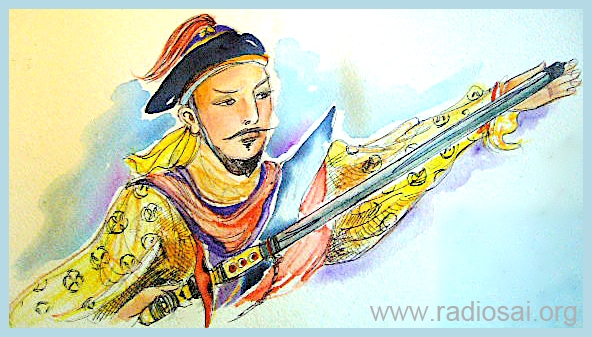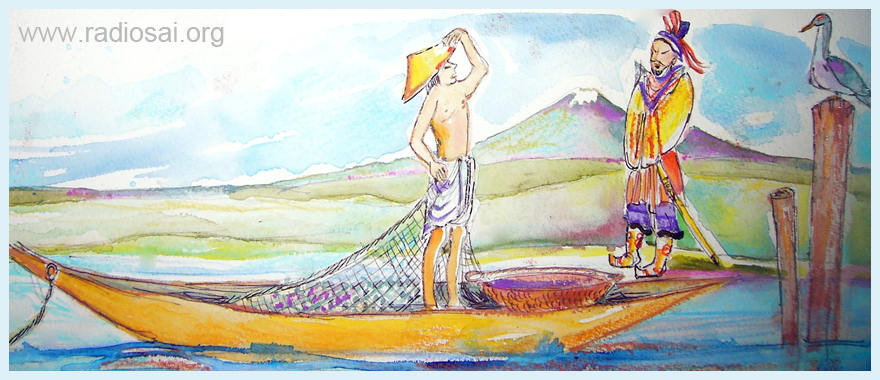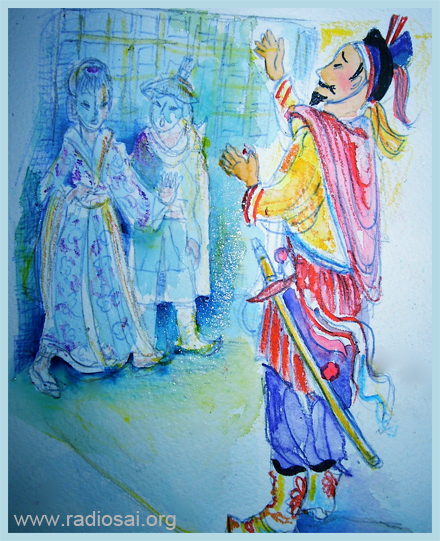|
|
| 'Like' us on Facebook | Follow us: |
Posted on: Mar 24, 2013
Do not Strike when Angry
Yashiko was a wealthy samurai warrior in ancient Japan. He cut a fine figure; his armour and sword were of the finest workmanship. His ornaments were of the finest variety: silver, copper, gold and bronze. Even the toggles on his tunic were priceless netsuke: masterfully carved figures of animals, insects, dragons and fishes, made of the purest ivory. He lived with his wife and elderly mother in an elegant tiled house in the best quarter of the town. He frequently drank the rarest and finest of teas, and often dined in the most expensive restaurants. His wife Ayako was considered the most beautiful woman in the kingdom, and his aged mother was much celebrated for her wisdom and learning.
Life was good for Yashiko. He had a handsome salary from the emperor, regular revenue from his many properties, and a hefty stake in a porcelain trading business. But even all this wealth was not enough for a man like Yashiko. To keep from getting bored (which was uncomfortably often) the proud and greedy samurai decided to start a moneylending business for poor people.
 |
“After all, it takes money to make money,” thought Yashiko. “You never know when a rainy day or a water flood or the wind dragons may come and wipe everything away. Life is at best uncertain. A day is bound to come when more money will be needed than what is presently being returned to me by my investments. The poor are always with us, and the poor always need money. I can charge them a high rate of interest and not have to lift a hand. What a clever way to make some extra cash! I wish I had thought of it long ago. Why, moneylending is practically a licence to mint money! I shall begin my new enterprise, at once! At once!”
Down at the docks, Michiko, a poor fisherman, had experienced an unlucky year with his business. Regretfully, he took out a sizeable loan from Yashiko so he could feed his wife and children. A year later, the loan had not been repaid. The proud samurai strapped on his deadly sword and strode off to find the fisherman and collect what was his due.
“I’ll show him who’s boss,” thought Yashiko.
“One look at me and my sword and he’ll come running with the money.”
Upon seeing Yashiko marching forcefully towards him, full of his own importance, the ragged fisherman bowed humbly before the proud samurai.
“O Revered Sir! Great Samurai! Noble Warrior! It has been a very bad year again for me. I do not have sufficient funds to repay you.”
“What!” shouted Yashiko furiously. “After all this time! You scoundrel! After all the time and patience I have shown you! A whole year has gone by and you cannot even show me a single yen in repayment! Now I am going to kill you!” Menacingly, he drew his sword.
Fearing his life was about to end, the fisherman spoke up loudly.
“Revered sir, for sometime now I have been studying martial arts. One of the lessons my master has taught me is that you should never strike another when you are angry.”
 |
“Hmmmmm,” thought Yashiko. “This is a clever fellow.” Just to be on the safe side, he lowered his sword.
“Your master is wise,’ said Yashiko carefully. “And I myself, as a student of the art of the sword, have heard that lesson many times. To be honest with you, O fisherman, I have such a temper that I often act without thinking. I tell you what I will do. You shall have another year to repay your debt. If you do not repay me in one year, I will come and take your life away with this sword.”
“Thank you, kind sir,’ murmured Michiko, bowing low.
Yashiko composed himself and walked away, his honour intact. By the time he had dined out at his favourite restaurant and arrived home it was nearly midnight. Seeing no lights in his house, he crept in quietly, not wishing to wake the servants or disturb his wife and aged mother. As he entered the house he lit the bronze oil lamp in the hallway. There he saw his wife whispering secretly to a strange man in the darkened living room at the end of the hall.
“What is the meaning of this insult!” shouted Yashiko. Swiftly he drew his sword, ready to kill them both instantly. Just then the words of the fisherman echoed in his fevered brain.
“Never strike when you are angry.”
 |
Yashiko paused and took a deep, laboured breath. Then his wife lit a candle.
To his amazement, he found himself face to face with not only his wife, but his beloved mother too, who was dressed like a man in his warrior clothing.
“What is the meaning of this? Are you both completely crazy? Is this a joke? I almost killed the two of you! I demand an explanation—immediately!”
“O Revered Husband,” murmured Ayako, “You, my lord, as a samurai, are the guardian and sole protector of this house. Because you had not returned by dark, Mother and I were afraid. We decided to dress Mother up in your clothes to keep away intruders.”
“Oh, my God! Oh, my ancestors!” wept Yashiko. He shivered at the thought that because of his terrible temper, he had nearly killed what he loved most in the world - his beloved wife and his adoring mother.
A year later, Yashiko went to see the poor fisherman down at the docks.
Michiko, upon seeing the samurai walking towards him, bowed humbly before him.
“It has been an excellent year’s fishing, my Lord! Please accept the money I owe you, plus interest.”
“Keep your money, dear man,” replied Yashiko gently.
“You don’t know it, but your debt was paid long ago.”
Bhagawan says on the subject of anger:
One's anger is one’s greatest enemy and one’s calmness is one’s own protection. One’s joy is one’s heaven and one’s sorrow is one’s hell… assume silence when you are invaded by anger. Or remember the name of the Lord. Do not try to remind yourself of things which will inflame the anger more... That will do incalculable harm. A man consumed by anger can never be free of misery. For the decline in human qualities today, pride and anger are primarily responsible.
Sanathana Sarathi Aug 1995 p 197
Story and Illustrations: Lyn Kriegler (New Zealand)






